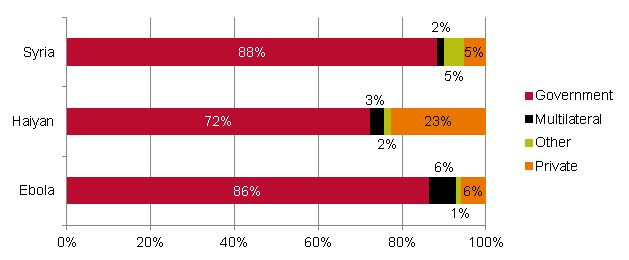Private donors provided 23% of Typhoon Haiyan response but only 5% and 6% to Syria and Ebola respectively
The most recent report from our Global Humanitarian Assistance (GHA) programme, Humanitarian assistance from non-state donors – Latest trends, shows that private donors continue to respond more generously to rapid-onset natural disasters than they do to chronic and conflict-related crises.
Private donors contributed an estimated combined total of US$5.4 billion of humanitarian assistance in 2013 (compared with US$5 billion in 2012), representing 25% of the total international humanitarian response in that year.
Data from UN Office for the Coordination of Humanitarian Affairs (OCHA) Financial Tracking Service (FTS) shows that Typhoon Haiyan in the Philippines triggered a significant funding response from private donors, who provided US$190 million, or 23% of the total response.
In comparison, private donors provided US$646 million in response to the ongoing violence in Syria, representing only 5% of total humanitarian assistance given to the crisis since it began in 2011. Similarly, funding from private donors represented a proportionately smaller amount of humanitarian assistance to the Ebola crisis in West Africa, providing just 6% of international humanitarian response (to note, much of the support provided by international donors to the Ebola crisis was classified as development rather than humanitarian funding and is therefore not included in these figures).
The Global Humanitarian Assistance programme’s dataset of private voluntary humanitarian contributions provides further insight into the volume and use of private funding for humanitarian assistance. Detailed analysis can be seen in the full report.
Download the data in Excel and CSV format
Notes
Data only includes private financial rather than in-kind support, apart from where a value for in-kind assistance was provided to the FTS.
GHA’s 2014 report Humanitarian assistance from non-state donors – Latest trends found that, according to historic data downloaded from the Disasters Emergency Committee website on funds raised by appeals going back to 1999, while the average amount of funding raised by an appeal related to conflict is £20.8 million, natural disasters raise on average over three times more, at £67.2 million.
‘Other’ includes allocation of unearmarked funds, carry-over (donors not specified) and various (details not yet provided).
Humanitarian crises in the graph appear in chronological order
Source
UN OCHA FTS
Related content
Priorities for the UK’s incoming Secretary of State Alok Sharma
As Alok Sharma takes office as Secretary of State, DI's Amy Dodd sets out key priorities for the UK and its global development agenda.
From review to delivery on the Global Goals – what should the immediate priorities be for the UK government?
On 26 June, the UK government published its Voluntary National Review measuring delivery against the Global Goals - but does it accurately capture progress?
Three priorities for the High-level Political Forum 2019
DI Director of Partnerships & Engagement Carolyn Culey sets out three key priorities for closing the gap between the poorest and the rest at HLPF 2019
